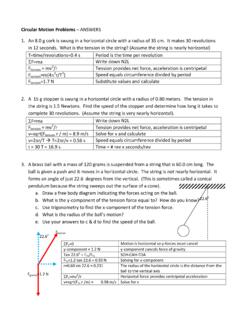Transcription of BEOWULF (Raffel translation) - Baltimore Polytechnic Institute
1 BEOWULF \eowulf is to England what Hcmer's ///ac/ and Odyssey are to ancient Greece: it is t^e first great work of a nationai literature. Becwulf is the mythical and literary record of a formative stage of English civilization; it is also an epic of the heroic sources of English cuitu-e. As such, it uses a host of tra- ditional motifs associated with heroic literature all over the world. Liks most early heroic lite r ature. BEOWULF is oral art. it was hanaes down, with changes, and embe'lishrnents. from one min- strel to another. The stories of BEOWULF , like those of all o r al epics, are traditional ones, familiar to tne audiences who crowded around the harp:st-bards in the communal halls at night.
2 The tales in the BEOWULF epic are the stories of dream and legend, of monsters and of god-fashioned weapons, of descents to the underworld and of fights with dragons, of the hero's quest and of a community threat- ened by the powers of evil. BEOWULF was composed in Old English, probably in Northumbria in northeast England, sometime between the years 700 and 750. The world it depicts, however, is much older, that of the early sixth century. Much of the material of the poem is based on early folk legends some Celtic, some Scandinavian. Since the scenery de- scribes tne coast of Northumbna.
3 Not of Scandinavia, it has been A Celtic caldron. MKer-plateci assumed that the poet who wrote the version that has come down i Nl ccnlun, ). to us was Northumbrian. Given the Cnristian elements in the epic, Nationalmuseel, ( opcnhagen. this poet may also have been a monk. w&zw/*. i j ,' , >. - i ".:> - , t ,^-vfet^rlTO3*^ivr1I^3K. ^-^5^: ^'J? ^4^1. ]2 The Anglo-Saxons The only manuscript we have of BEOWULF dates from the year 1000 and is now in the British Museum in London. Burned and stained, it was discovered in the eighteenth century: Somehow it had survived Henry Vlll's destruction of the monasteries two hun- dred years earlier.
4 By the standards of Homer, whose epics run to nearly 15,000. lines, BEOWULF , with approximately 3,200 lines, is relatively short. The epic tells the story of BEOWULF (his name may mean "bear"), a Geat from Sweden who crosses the sea to Denmark in a quest to rescue King Hrothgar from the demonic monster Grendel. This epic hero, who emerges from the misty reaches of the English past, is a far-Northern mask of a national hero "type," who in other stories wears the mask of St. George or King Arthur. This hero- type is the dragon slayer, the representative of a beseiged com- munity that stands in precarious unity against the satanic forces that lurk everywhere in the cold darkness.
5 When Grendel appeared to the Anglo-Saxon listener, he was not viewed as a legend; he was the embodiment of an all-too-present reality. A List of Characters and Places Here are some of the important people, monsters, and places that appear in BEOWULF or are mentioned in the story: BEOWULF : a Geat, son of Edgetho and nephew of Higlac, king of the Geats. Higlac is BEOWULF 's feudal lord, as well as his uncle. Brecca: chief of a tribe called Brondings and a friend of Beo- wulf. Grendel: a man-eating monster who lives at the bottom of a foul mere, or mountain lake. His name might be related to the old Norse grindill, meaning "storm," or grenja, "to bel- low.
6 ". Herot: the golden guest-hall built by King Hrothgar, the Danish ruler. It was decorated with the antlers of stags; the name means "hart [stag] hall." Scholars think Herot might have been built near Lejre on the coast of Zealand, in Denmark. Hrothgar: king of the Danes, builder of Herot. He had once befriended BEOWULF 's father. His father was called Healfdane Page from the BEOWULF manuscript (which probably means "half Dane"). Hrothgar's name might (c. 1000). mean "glory spear" or "spear of triumph." British Library. Unferth: one of Hrothgar's courtiers, who is reputed to be a skilled warrior.
7 His sword, called Hrunting, is used by BEOWULF in a later battle. Welthow: Hrothgar's wife, queen of the Danes. Wiglaf: a Geat warrior, one of BEOWULF 's select band, and the only one to help him in his final fight with the dragon. Wiglaf might be related to BEOWULF . BEOWULF 13. I. I. The epic BEOWULF had been told by the Anglo-Saxons for over five From hundred years before it was finally written down. As you read, see if you can understand why it has remained popular. TRADITIONAL EPIC. Translated by Burton Raffel Prologue Hear me! We've heard of Danish heroes, Ancient kings and the glory they cut For themselves, swinging mighty swords!
8 How Shild1 made slaves of soldiers from every Land, crowds of captives he'd beaten Into terror; he'd traveled to Denmark alone, An abandoned child, but changed his own fate, Lived to be rich and much honored. He ruled Lands on all sides: wherever the sea Would take them his soldiers sailed, returned 10. With tribute and obedience. There was a brave King! And he gave them more than his glory, Conceived a son for the Danes, a new leader Allowed them by the grace of God. They had lived, Before his coming, kingless and miserable; 15. Now the Lord of all life, Ruler Of glory, blessed them with a prince, Beo,2.
9 Whose power and fame soon spread through the world. Carved wooden head from a ship's 1. Shild, a Danish king. He arrived in Denmark alone in a ship when he tentpost, Gokstad ship-burial. was a child. The ship was loaded with many treasures. Copyright University Museum of National 2. Beo, grandfather of Hrothgar, a Danish king. Antiquities, Oslo, Norway. 108 THE ANGLO-SAXON PERIOD. Shild's strong son was the glory of Denmark;. His father's warriors were wound round his heart 20. With golden rings, bound to their prince By his father's treasure. So young men build The future, wisely open-handed in peace, Protected in war; so warriors earn Their fame, and wealth is shaped with a sword.
10 25. When his time was come the old king died, Still strong but called to the Lord's hands. His comrades carried him down to the shore, Bore him as their leader had asked, their lord And companion, while words could move on his tongue. 30. Shild's reign had been long; he'd ruled them well. There in the harbor was a ring-prowed fighting Ship, its timbers icy, waiting, And there they brought the beloved body Of their ring-giving lord, and laid him near 35. The mast. Next to that noble corpse They heaped up treasures, jeweled helmets, hooked swords and coats of mail, armor Carried from the ends of the earth: no ship Had ever sailed so brightly fitted, 40.








